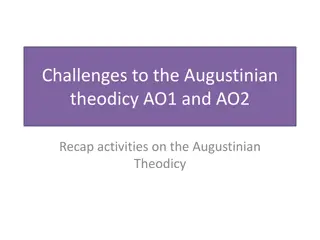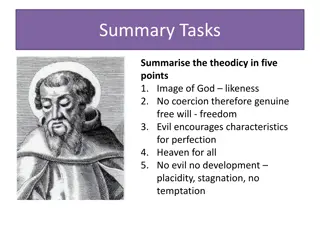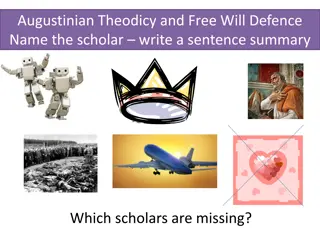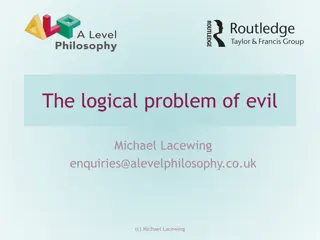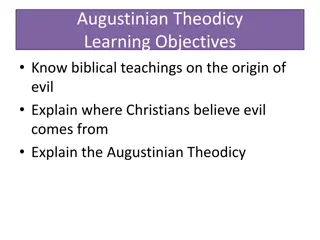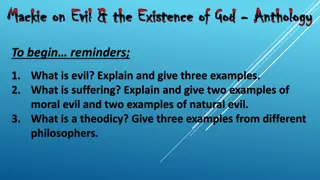Challenges to the Augustinian Theodicy: An Evaluation of Key Objections
The Augustinian theodicy, based on the assumptions of a faultless creation and the existence of evil from elsewhere, faces challenges from various angles. Scientific, moral, and theological objections question the validity of the Genesis account, the moral implications of Hell, and the ethical consi
0 views • 19 slides
Revisiting the Irenaean Theodicy
The Irenaean Theodicy presents a unique perspective on the problem of evil, emphasizing qualities such as human likeness to God, free will, and the role of evil in shaping character towards perfection. It posits that suffering contributes to moral and spiritual development, ultimately leading to a p
0 views • 19 slides
Exploring Theodicies: Augustine, Irenaeus, and Free Will
Scholars like Plantinga, Kierkegaard, and Swinburne offer insights into the Augustinian Theodicy and Free Will Defense. They discuss issues of human free will, the role of evil, and God's plan for humanity. In contrast, the Irenaean Theodicy emphasizes soul-making, human development, and the eventua
0 views • 28 slides
Exploring the Logical Problem of Evil and Theodicies
The logical problem of evil questions the existence of a supremely good, omnipotent, omniscient God in the face of evil. Two types of evil, moral and natural, are considered. Responses include the free will theodicy and objections regarding choice and free will. Theodicy versus defense is explored a
0 views • 12 slides
Understanding Augustine's Theodicy and the Origin of Evil in Christianity
Augustine's Theodicy is a philosophical attempt to justify God's existence despite the presence of evil in the world, rooted in biblical teachings on the origin of evil and human free will. This theodicy explores how Christians perceive the existence of evil, how it relates to sin and redemption, an
0 views • 16 slides
Mackie on Evil & the Existence of God: The Problem of Evil
Mackie, known for defending atheism, argued that the problem of evil challenges monotheistic religions. He critiqued the free will defense, claiming that God's attributes of omniscience, omnipotence, and goodness conflict with the existence of evil. The anthology explores different perspectives on e
0 views • 6 slides
